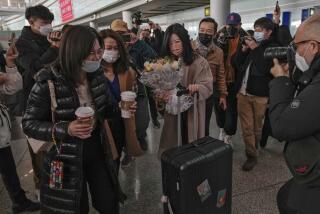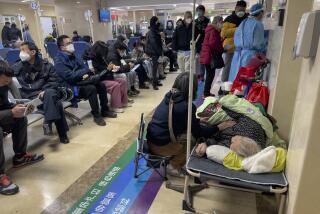In Beijing, more surgical masks but business as usual despite coronavirus outbreak
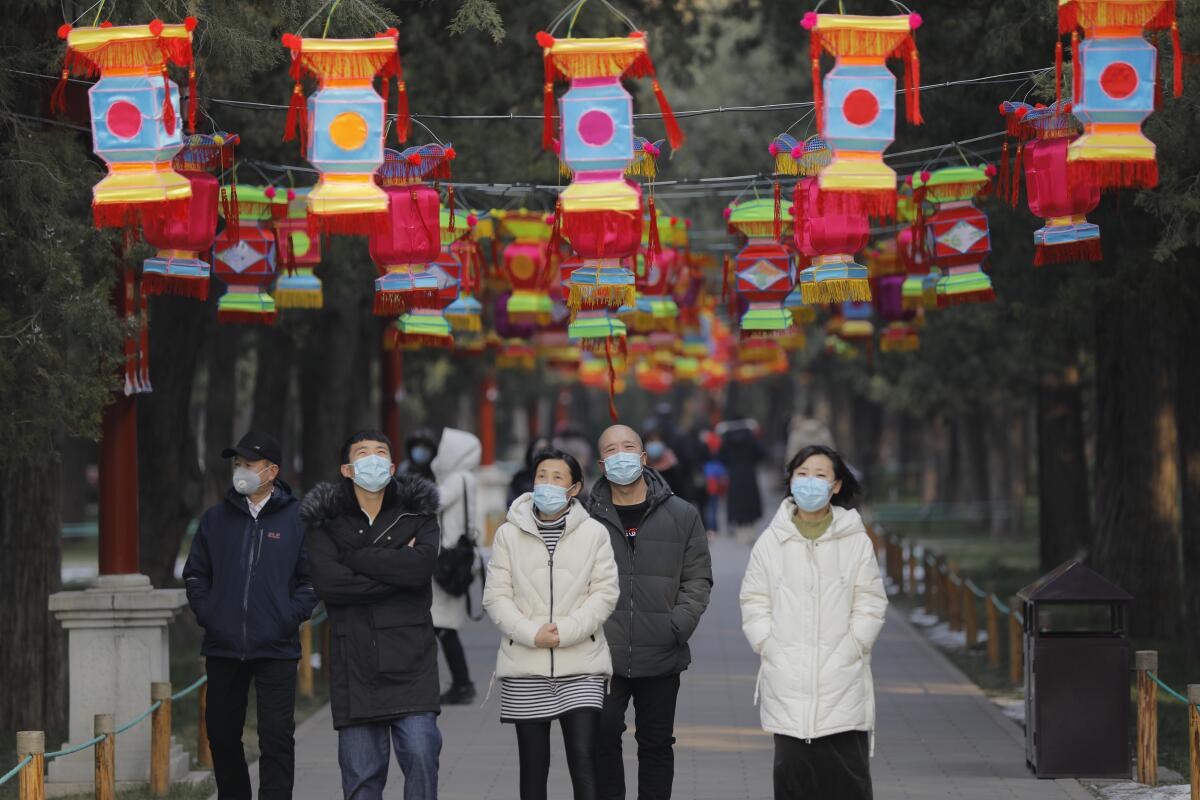
- Share via
BEIJING — As the coronavirus outbreak in China intensified, with deaths rising and 36 million people under lockdown near the epicenter, it was business as usual more than 700 miles away in the capital, Beijing.
The only signs anything was amiss: More surgical masks than usual obscuring the faces of pedestrians, subway riders and motorcyclists, and, among some, a vague anxiety that things could get worse.
The death toll rose to 41 but the attitude among Beijingers and tourists could be summed up as less than panicky and more of “let’s be ready just in case.” An annoyance tucked into a communal shrug at the unknown.
Many residents had already left town for the Lunar New Year holiday by the time the outbreak worsened a few days ago. Every year at this time, the capital empties, and 2020 is no different, if perhaps a bit more eerie, with the Year of the Rat set to begin Saturday.
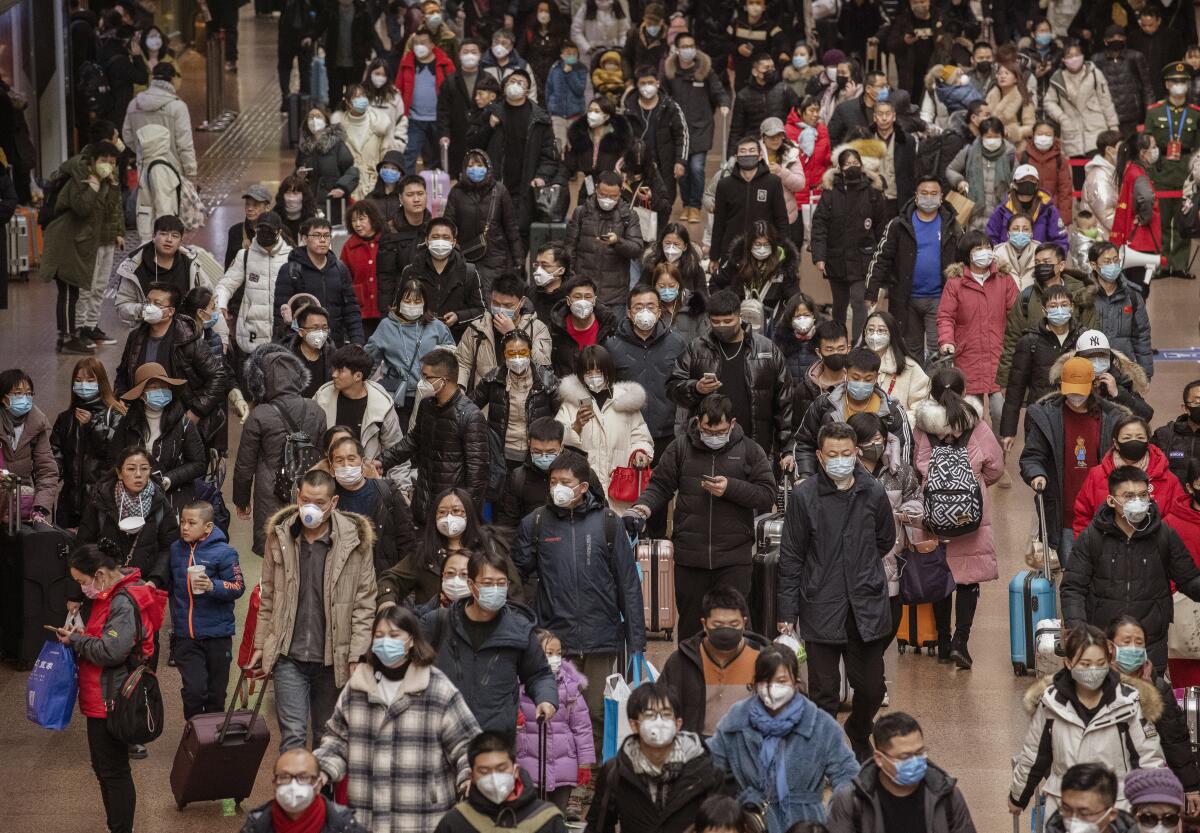
On Friday, New Year’s Eve, many restaurants were closed, with handwritten signs indicating when their owners would return. Subway trains, normally crowded even in off-peak hours, had plenty of seats. Locals stocked up on food for the holiday weekend, when even supermarkets would be closed. Tourists did what tourists do, snapping photos of themselves in social media-worthy settings.
It is common in East Asia to wear surgical masks to avoid getting a cold or transmitting one. But noticeably more people than usual were masked in Beijing.
Already bundled up against the 40-degree weather in heavy coats and hats, people in light blue, white or black masks, some with high-tech ventilation knobs, walked through the city with only their eyes showing. Security guards at subway stations and soldiers standing at attention near Tiananmen Square wore masks too.
At least five coronavirus cases have been diagnosed in the capital city, and the virus has also spread to other countries, including the U.S., though most patients had recently been in the central Chinese city of Wuhan, the capital of Hubei province.
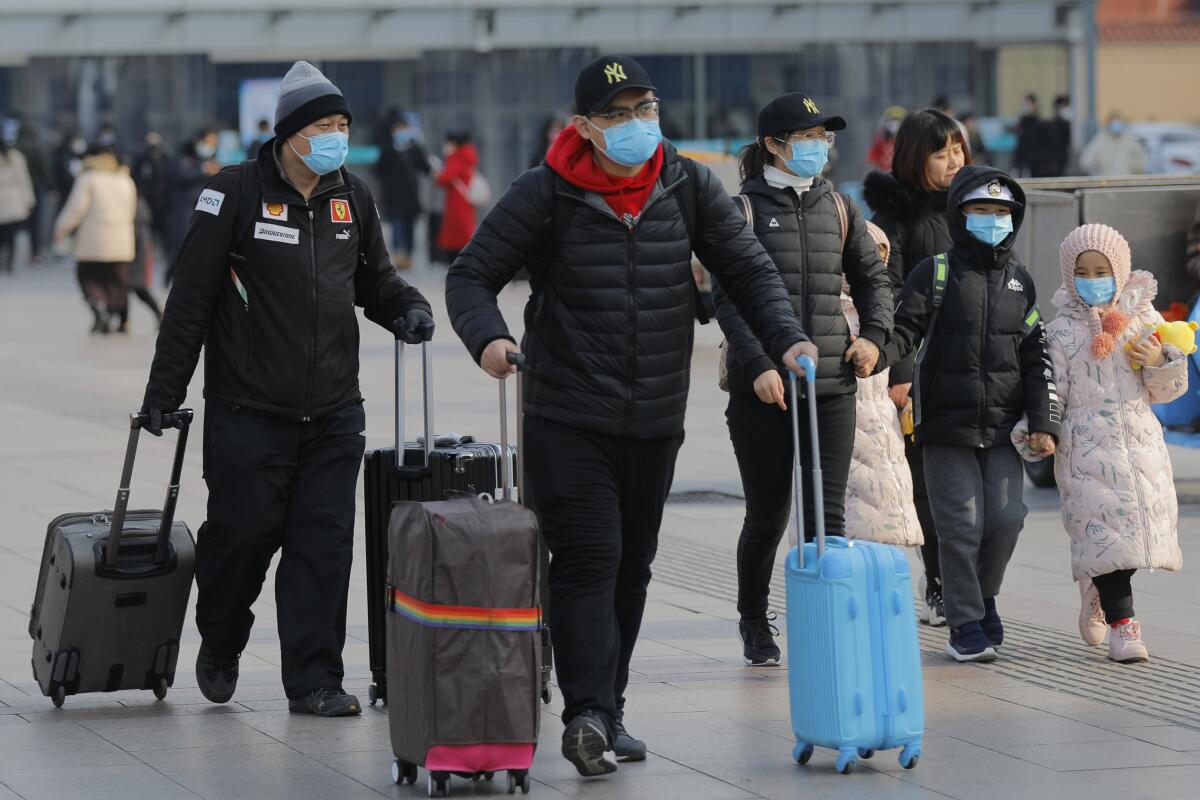
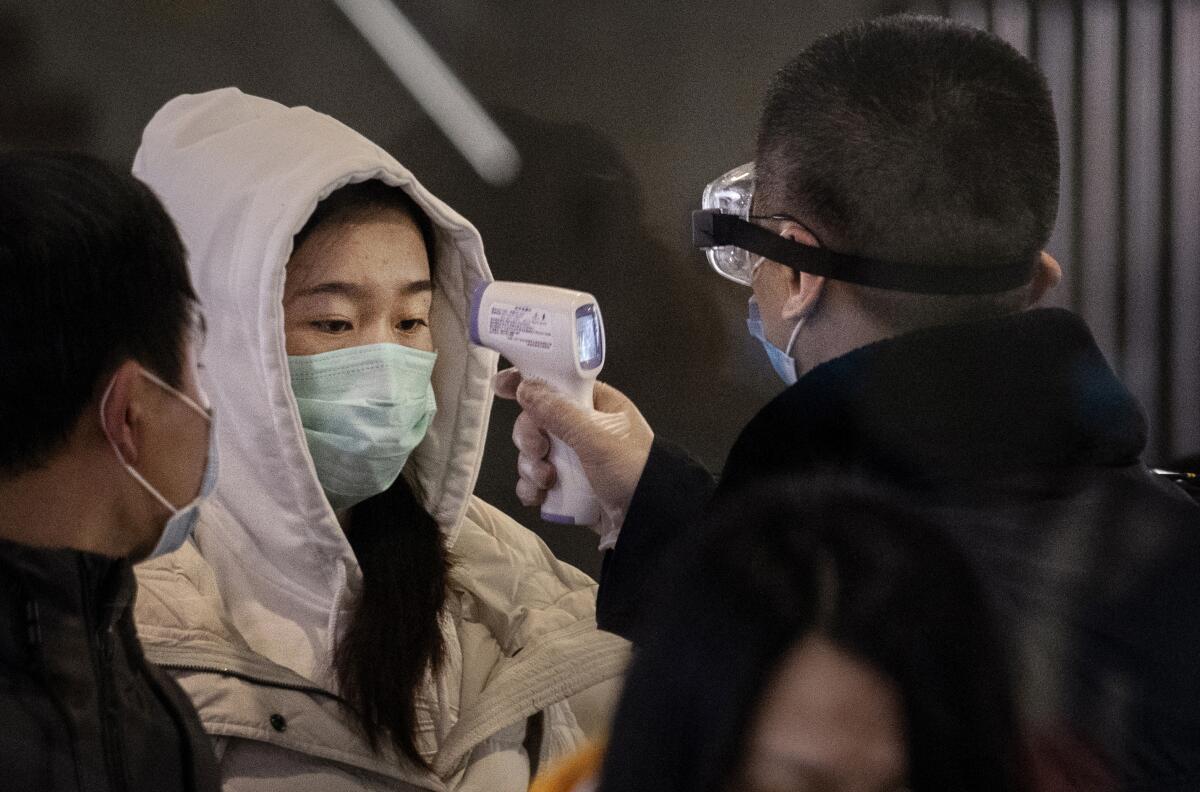
Scientists are still determining whether the virus’ lethality is more like the flu’s or that of SARS, a deadlier virus in the same family that ravaged Asia in 2003. Many of the coronavirus fatalities have been among the elderly. The virus is thought to have been transmitted from an animal to a human at a seafood and wildlife market in Wuhan.
In recent days, a coronavirus death occurred for the first time in a place other than Hubei — in Hebei province, which surrounds Beijing.
Meanwhile, in Wuhan, hospitals were overwhelmed with patients with flu-like symptoms, whether or not they actually had the coronavirus. Residents prepared for a siege with only the odds and ends in their pantries, scared to go out or lacking the surgical masks mandatory in the city.
For them, the new year holiday, normally a time to gather with extended family for days of feasting, has been ruined.
Yanzhong Huang, who has researched SARS extensively, predicted the coronavirus would spread more broadly in other parts of China and beyond. What is unknown, he said, is the seriousness of the infection and how much the virus may mutate as it migrates from host to host.
The timing, just before the Lunar New Year and the world’s biggest annual mass migration, could not have been worse. The Chinese government’s unprecedented quarantine of Wuhan, population 11 million, and surrounding cities may have been too little, too late.
Wuhan, which Huang called the Chicago of China, is a magnet for high-tech workers, students and academics, as well as those in the service and construction industries. Many people had already skipped town for the holiday or to flee the virus.
“When this happens in China, with hundreds of millions of people traveling and mixing, it’s like a petri dish for a virus to mutate and likely become more virulent,” said Huang, who directs the Center for Global Health Studies at Seton Hall University and is a senior fellow for global health at the Council on Foreign Relations.
For all the people in masks in Beijing, a significant minority went without on New Year’s Eve.
In front of an upscale shopping mall near the Forbidden City, three restaurant cooks strolled down East Chang’an Road with bare faces. They trusted fate — and the Chinese government — not to send any deadly pathogens their way.
“It’s better to wear a mask, but not wearing one is fine too,” said Li Jiangyun, 45. “I don’t think it’ll get here. The country will take care of it.”
Li’s coworker, Wang Hao, 22, said Beijing was so crammed with people, some masked and some not, that his odds of contracting the virus were low.
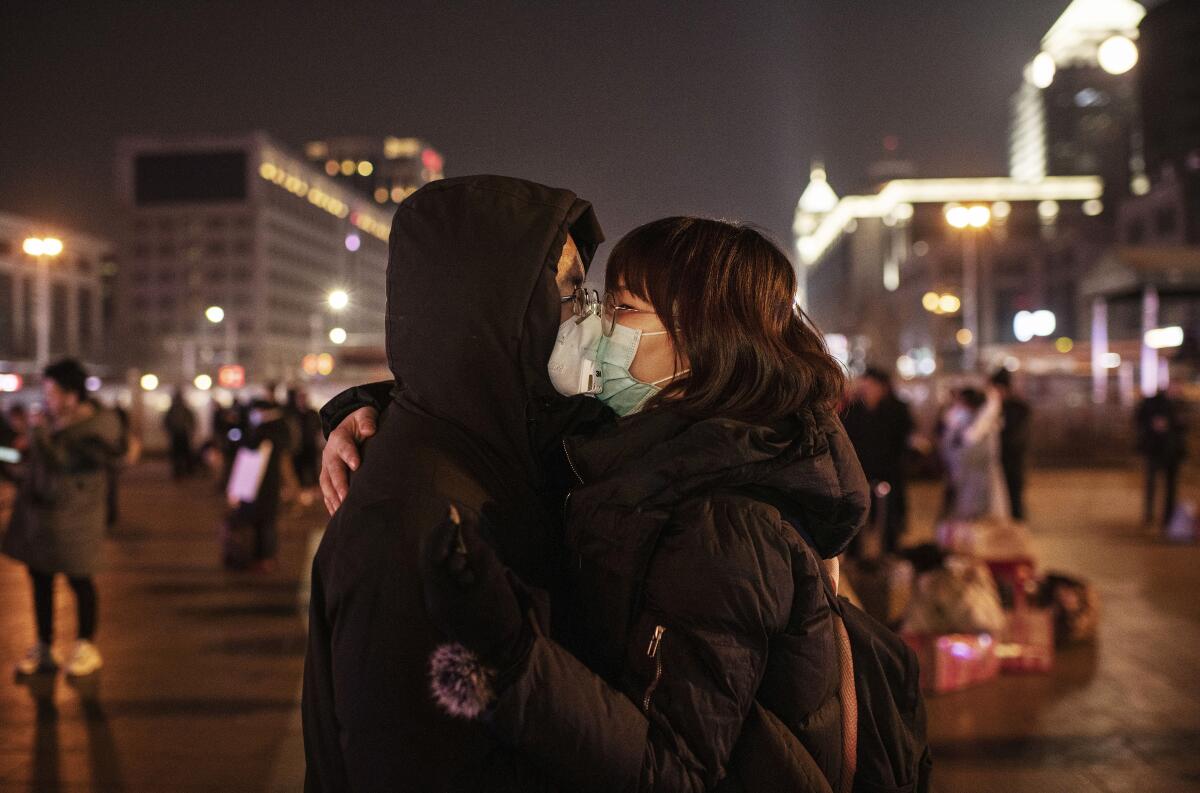
All three men, who work at the same restaurant, decided not to travel to their hometowns for the holiday because train tickets were too hard to get. It is lonely being far from home in a city largely emptied of residents, on a holiday normally spent with family, said Li, who is from the Xinjiang region in far western China. The third cook, Ah Buli, 22, is also from Xinjiang, and Wang is from Ningxia province.
Many tourists came to the capital city despite the virus and were taking in the sights.
At the Forbidden City, tourists swarmed the walkways along the palace’s high walls and frozen moat, even though the gates were closed to visitors.
Media reports had said the former imperial palace was shut down because of the virus. But a guard said the New Year’s Eve closure had been scheduled in advance, and the palace would open on New Year’s Day at 8:30 a.m.
In a busy shopping plaza near the palace, a high school student visiting Beijing from Henan province wore a black surgical mask but said he was not worried about catching the virus.
“It’s been controlled very well,” said the student, 16, surnamed Yao, who would not give his first name.
His mother was not worried, either.
“You just need to pay attention,” she said, though it was unclear from her remark how she would distinguish a coronavirus-bearing person from a germ-free one.
A family of three from the city of Chengdu in Sichuan province bought surgical masks after arriving in Beijing on Monday. They had toured many historic sites in four days: the Great Wall, the Forbidden City, the Summer Palace, the Temple of Heaven.
They said they were not concerned about the virus spreading and had gotten the masks as a precaution.
“We bought them here in Beijing!” said the 9-year-old son, whose English name is Gary, showing off his blue checkered mask.
A public safety officer hovered over the interview, then stopped it, saying there was no need for a foreign journalist to speak with ordinary people.
More to Read
Sign up for Essential California
The most important California stories and recommendations in your inbox every morning.
You may occasionally receive promotional content from the Los Angeles Times.

